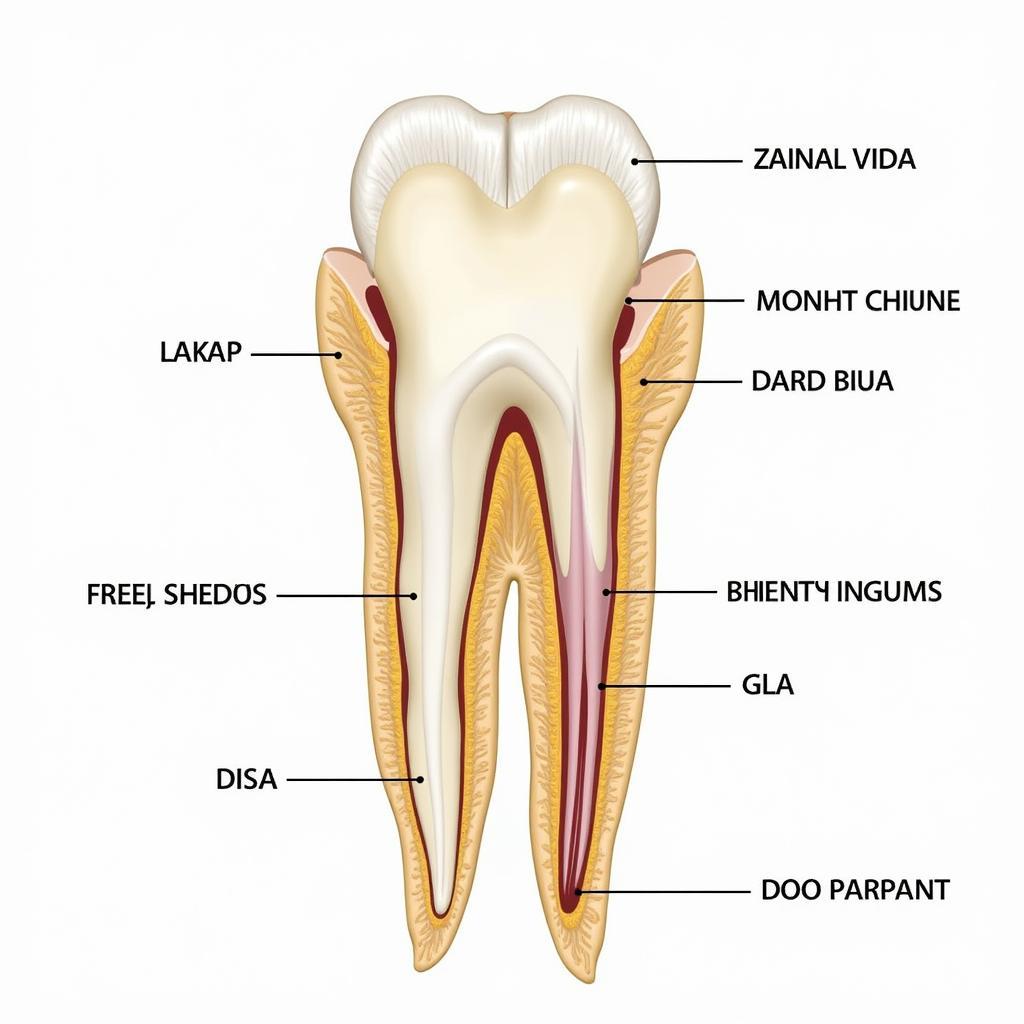Horse Root, while not a specific anatomical term, commonly refers to the roots of a horse’s teeth. These vital structures anchor the teeth firmly in the jaw, allowing horses to graze and chew effectively. Understanding the importance of horse teeth roots and potential issues that can arise is crucial for every horse owner.
The Importance of Healthy Horse Teeth Roots
Healthy teeth roots are essential for a horse’s overall well-being. They provide the necessary support for the teeth, enabling proper chewing and digestion. Without healthy roots, horses can experience pain, difficulty eating, and even weight loss. Regular dental checkups are crucial for identifying and addressing any potential problems early on. These checkups allow veterinarians to examine the teeth and identify any signs of infection, damage, or abnormalities affecting the roots.
Horses are hypsodont animals, meaning their teeth continuously erupt throughout their lives. This constant growth helps compensate for the wear and tear caused by grazing. However, it also means that dental problems, including those affecting the roots, can develop gradually and go unnoticed without regular dental care. Early detection is key to preventing more serious complications.
Problems with a horse’s teeth roots can manifest in various ways, including facial swelling, difficulty chewing, quidding (dropping partially chewed food), and even behavioral changes. If you notice any of these signs, it’s crucial to consult with a veterinarian experienced in equine dentistry. They can perform a thorough examination and recommend the appropriate course of action. Sometimes, issues related to the horse root can also cause problems with the horse rearing, a dangerous behavior that needs addressing. More information about this can be found on our page about horses rear.
 Diagram of Horse Teeth Roots
Diagram of Horse Teeth Roots
Common Problems Affecting Horse Teeth Roots
Several factors can affect the health of a horse’s teeth roots. One common issue is tooth root abscesses, which are infections that develop at the root of a tooth. These abscesses can cause significant pain and discomfort and require prompt veterinary attention. You can learn more about this specific issue on our page dedicated to tooth root abscess horse. Another potential problem is root fractures, which can occur due to trauma or excessive force on the tooth. These fractures can compromise the stability of the tooth and may require extraction.
Another less common, but important issue, is the relationship between horses and humans. While it is a sensitive topic, understanding the boundaries and ethical considerations surrounding this interaction is crucial. More information on this complex issue can be found on our page discussing women and horses sex.
Preventing Horse Root Problems
While not all dental problems are preventable, several steps can be taken to minimize the risk of issues affecting a horse’s teeth roots. Regular dental checkups, as mentioned earlier, are essential. Providing a balanced diet with appropriate forage is also crucial, as it helps promote proper chewing and wear of the teeth. Avoiding hard or abrasive foods can also help prevent fractures and damage to the roots. Additionally, ensuring proper bit fit and avoiding excessive pulling on the reins can reduce the risk of trauma to the teeth and surrounding structures.
Dr. Emily Carter, DVM, an equine dental specialist, emphasizes the importance of preventative care: “Regular dental exams are the cornerstone of maintaining healthy teeth roots in horses. Early detection and intervention can prevent minor issues from escalating into major problems.”
What Are the Signs of a Horse Root Problem?
Several signs can indicate a potential problem with a horse’s teeth roots. These include:
- Facial swelling
- Difficulty chewing
- Quidding (dropping partially chewed food)
- Bad breath
- Weight loss
- Behavioral changes
If you observe any of these signs, consult your veterinarian immediately.
Conclusion
Understanding the importance of horse root health is essential for every horse owner. By prioritizing regular dental care, providing a balanced diet, and being aware of potential problems, you can help ensure your horse’s teeth and roots remain healthy and strong throughout its life. If you have any concerns about your horse’s dental health, consulting with an equine veterinarian is always the best course of action. Don’t forget, for horseshoes and related needs in North Carolina, check out Root & Bone Horse Shoe NC. And if you’re interested in a unique pairing, explore our page on whisky with horse.
FAQs
- How often should a horse have its teeth checked?
- What are the common causes of tooth root abscesses in horses?
- Can a fractured tooth root be repaired?
- What should I feed my horse to promote good dental health?
- What are the signs of dental pain in horses?
- How much does equine dental care typically cost?
- Can I perform dental procedures on my horse myself?
Need help? Contact us! Phone: 0772127271, Email: [email protected]. Visit us at QGM2+WX2, Vị Trung, Vị Thuỷ, Hậu Giang, Việt Nam. We have a 24/7 customer service team.